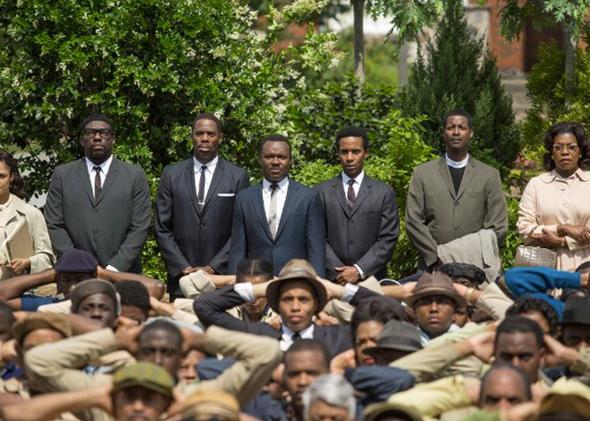It’s hard to know what to make of Selma’s peculiar showing at the announcement of this year’s Oscar nominations this morning: No nod for the critically acclaimed, stunning direction of Ava DuVernay; no nomination for Paul Webb’s stirring screenplay; no nomination for David Oyelowo, who perfectly embodies one of the most iconic figures in American history without resorting to mere mimicry. And yet somehow Selma lands in the Best Picture category.
On the one hand, it’s disappointing; if we’re really going to compare art (and that’s what the Oscars do), the fact that Morten Tyldum (whose direction of The Imitation Game is pedestrian) and a stilted performance from a makeup-enhanced Steve Carell made the shortlist instead of DuVernay and Oyelowo, respectively, is preposterous. (And that’s not even getting into the all-white acting categories.)
But there is a silver lining, even if it feels sort of like a consolation prize: Selma is a Best Picture nominee, and it has every right to be there. For one, hardly anyone, except maybe the historians at the Lyndon Baines Johnson Library and Museum, disputes the film’s technical and artistic merits: It currently holds a 99 percent fresh rating on Rotten Tomatoes. But more impressively, DuVernay’s powerful film about the push for the Voting Rights Act of 1965 is the first major cinematic drama about the civil rights movement that focuses more on black people’s efforts in the quest for social progress than on white people’s. Its nomination makes a nice counterpoint—though certainly not a corrective—to the many years of Hollywood films that have depicted the civil rights struggle primarily through the eyes of white characters: The Long Walk Home, Ghosts of Mississippi, Heart of Dixie, even the delightfully charming Hairspray all viewed social change during that pivotal era from a predominantly white perspective.
And the academy has embraced many of these types of films before, too—much to the chagrin of careful observers of history. Leave aside Driving Miss Daisy’s notorious Best Picture win in the same year that the contemporary, unflinching Do the Right Thing wasn’t even nominated. The academy nominated 1967’s Guess Who’s Coming to Dinner, an out-of-touch drama about old white people learning that the post-civil rights era meant (reluctantly) accepting interracial dating. (The slightly more progressive In the Heat of the Night won that year.) They nominated 2011’s The Help, a drama ostensibly “about” the racism black Mississippi maids encountered in the 1960s, but really more interested in how racism affects Emma Stone. Most egregiously, there’s 1988’s Mississippi Burning, about two FBI agents (Gene Hackman and Willem Dafoe) on the hunt for the murderers of three young civil rights workers. “How can you make a movie about the civil rights era without having any major black characters?” film historian Donald Bogle wrote for Essence in 1989. “Watching Mississippi Burning, one would never know that it was black southerners who propelled the fight for civil rights and who put their lives on the line.”
But with Selma, DuVernay rightly and effectively puts the black community at the center of the change of that moment, revealing in dramatic form the many moving parts that it took to get an important bill passed. It is not merely an “MLK biopic,” as many (including me) dubbed it before seeing it—it’s about the many black people (John Lewis, Hosea Williams, Andrew Young) and support from progressive non-blacks (James Reeb, Archbishop Iakovos) that it took to push progress forward when Lyndon B. Johnson wanted to focus on other policy battles first.
And that, perhaps more than anything else, is what makes Selma such an ideal Oscar contender, and what makes its Best Picture nomination truly matter. It rises above other biopics—including its fellow nominees The Imitation Game and The Theory of Everything—because it doesn’t cling to the ingrained falsehood that one extraordinary, brilliant man can be solely, or almost entirely, responsible for a major societal breakthrough. Is King portrayed by DuVernay as the inspiring force that he was? Of course—she doesn’t deny history. But she also shows how King could never have gotten things done without the minds, the risk, the sweat, and the cooperation of many others. And in that sense, the academy has finally gotten this side of history right.
